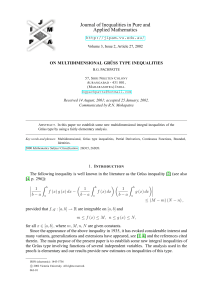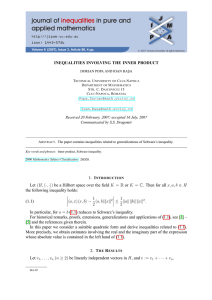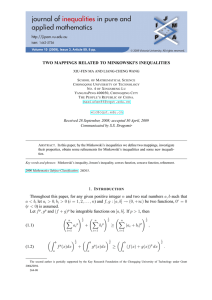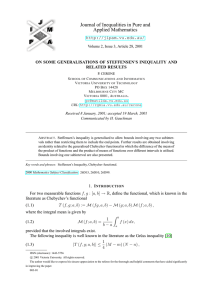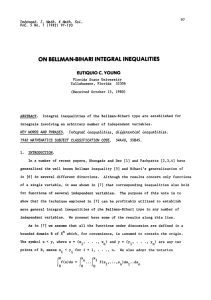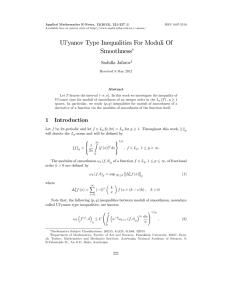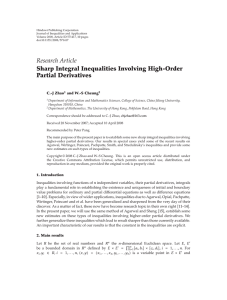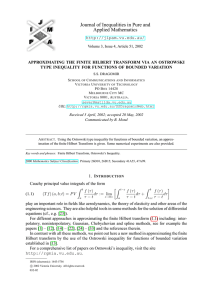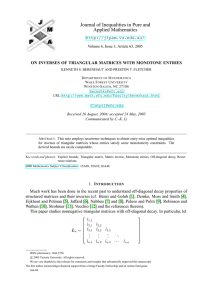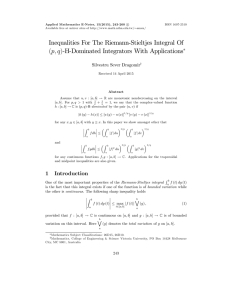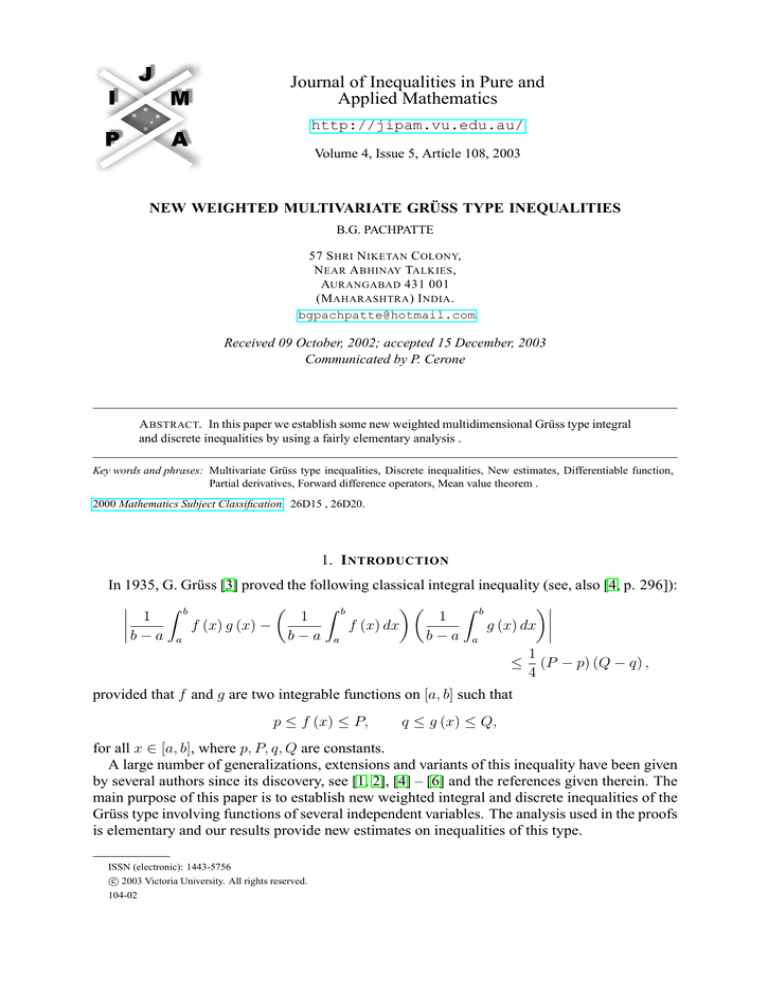
Journal of Inequalities in Pure and
Applied Mathematics
http://jipam.vu.edu.au/
Volume 4, Issue 5, Article 108, 2003
NEW WEIGHTED MULTIVARIATE GRÜSS TYPE INEQUALITIES
B.G. PACHPATTE
57 S HRI N IKETAN C OLONY,
N EAR A BHINAY TALKIES ,
AURANGABAD 431 001
(M AHARASHTRA ) I NDIA .
bgpachpatte@hotmail.com
Received 09 October, 2002; accepted 15 December, 2003
Communicated by P. Cerone
A BSTRACT. In this paper we establish some new weighted multidimensional Grüss type integral
and discrete inequalities by using a fairly elementary analysis .
Key words and phrases: Multivariate Grüss type inequalities, Discrete inequalities, New estimates, Differentiable function,
Partial derivatives, Forward difference operators, Mean value theorem .
2000 Mathematics Subject Classification. 26D15 , 26D20.
1. I NTRODUCTION
In 1935, G. Grüss [3] proved the following classical integral inequality (see, also [4, p. 296]):
Z b
Z b
Z b
1
1
1
f
(x)
g
(x)
−
f
(x)
dx
g
(x)
dx
b − a
b
−
a
b
−
a
a
a
a
1
≤ (P − p) (Q − q) ,
4
provided that f and g are two integrable functions on [a, b] such that
p ≤ f (x) ≤ P,
q ≤ g (x) ≤ Q,
for all x ∈ [a, b], where p, P, q, Q are constants.
A large number of generalizations, extensions and variants of this inequality have been given
by several authors since its discovery, see [1, 2], [4] – [6] and the references given therein. The
main purpose of this paper is to establish new weighted integral and discrete inequalities of the
Grüss type involving functions of several independent variables. The analysis used in the proofs
is elementary and our results provide new estimates on inequalities of this type.
ISSN (electronic): 1443-5756
c 2003 Victoria University. All rights reserved.
104-02
2
B.G. PACHPATTE
2. S TATEMENT OF R ESULTS
In what follows, R and N denote the set of real and natural numbers respectively.
n
Q
Let Di [a, b] = {xi : ai < xi < bi } for i = 1, . . . , n, ai , bi ∈ R, D =
Di [ai , bi ] and D̄ be
i=1
the closure of D. For a differentiable function u (x) : D̄ → R, we denote the first order partial
R
derivatives by ∂u(x)
(i
=
1,
.
.
.
,
n)
and
u (x) dx the n-fold integral
∂xi
D
Z b1
Z bn
···
u (x1 , . . . , xn ) dx1 . . . dxn .
a1
an
If
∂u (x) ∂u ∂xi < ∞,
∂xi = sup
x∈D
∞
then we say that the partial derivatives ∂u(x)
are bounded. Let Ni [0, ai ] = {0, 1, 2, . . . , ai } , ai ∈
∂xi
n
Q
N, (i = 1, . . . , n) and B =
Ni [0, ai ]. For a function z (x) : B → R we define the first order
i=1
forward difference operators as
∆1 z (x) = z (x1 + 1, x2 , . . . , xn ) − z (x) , . . . , ∆n z (x) = z (x1 , . . . , xn−1 , xn + 1) − z (x)
and denote the n-fold sum over B with respect to the variable y = (y1 , . . . , yn ) ∈ B by
X
z (y) =
y
aX
1 −1
···
y1 =0
aX
n −1
z (y1 , . . . , yn ) .
yn =0
Clearly,
X
z (y) =
y
X
z (x)
for x, y ∈ B.
x
If k∆i zk∞ = sup |∆i z (x)| < ∞, then we say that the partial differences ∆i z (x) are bounded.
x∈B
The notation
x
i −1
X
∆i z (y1 , . . . , yi−1 , ti , xi+1 , . . . , xn ) , xi , yi ∈ Ni [0, ai ] (i = 1, . . . , n) ,
ti =yi
P −1
P −1
∆n
we mean for i = 1 it is xt11=y
∆1 z (t1 , x2 , . . . , xn ) and so on, and for i = n it is xtnn=y
n
1
×z (y1 , . . . , yn−1 , tn ). We use the usual convention that the empty sum is taken to be zero. We
use the following notations to simplify the details of presentation.
For continuous functions p, q defined on D̄ and differentiable
on D, w (x) a real-valued nonR
negative and integrable function for every x ∈ D with D w (x) dx > 0 and xi , yi ∈ Di [ai , bi ],
we set
Z
A [w, p, q] =
w (x) p (x) q (x) dx
D
Z
Z
1
−R
w (x) q (x) dx ,
w (x) p (x) dx
w (x) dx
D
D
D
n X
∂p H [p, xi , yi ] =
∂xi |xi − yi | .
i=1
J. Inequal. Pure and Appl. Math., 4(5) Art. 108, 2003
∞
http://jipam.vu.edu.au/
N EW W EIGHTED M ULTIVARIATE G RÜSS T YPE I NEQUALITIES
3
For the functions p, q : B → R whoseP
forward differences ∆i p, ∆i q exist, w (x) a real-valued
nonnegative function defined on B and w (x) > 0 and xi , yi ∈ Ni [0, ai ], we set
x
L [w, p, q] =
X
x
!
1
w (x) p (x) q (x) − P
w (x)
X
x
x
M [p, xi , yi ] =
n
X
w (x) p (x)
!
X
w (x) q (x) ,
x
k∆i pk∞ |xi − yi | .
i=1
Our main results on weighted Grüss type integral inequalities involving functions of many independent variables are embodied in the following theorem.
Theorem 2.1. Let f, g be real-valued continuous functions on D̄ and differentiable on D whose
∂f ∂g
derivatives ∂x
,
are bounded. Let w (x) be a real-valued, nonnegative and integrable funci ∂xi R
tion for x ∈ D and D w (x) dx > 0. Then
(2.1)
1
|A [w, f, g]| ≤ R
2 D w (x) dx
Z
w (x) |g (x)|
H [f, xi , yi ] w (y) dy
Z
D
D
Z
+ |f (x)|
H [g, xi , yi ] w (y) dy dx,
D
(2.2)
|A [w, f, g]| ≤ R
D
w (x) dx
Z
Z
1
2
w (x)
D
H [f, xi , yi ] w (y) dy
D
Z
×
H [g, xi , yi ] w (y) dy dx.
D
Remark 2.2. If we take n = 1 and D = I = {a < x < b} in (2.1), then we get
Z
Z b
Z b
b
1
w (t) f (t) g (t) dt − R b
w (t) f (t) dt
w (t) g (t) dt a
w (t) dt
a
a
a
Z b
Z b
1
≤ Rb
w (t) |g (t)|
kf 0 k∞ |t − s| w (s) ds
2 a w (t) dt a
a
Z b
0
+ |f (t)|
kg k∞ |t − s| w (s) ds dt.
a
Similarly, one can obtain the special version of (2.2). It is easy to see that the upper bound given
on the right side in the above inequality (when w(t) = 1) is different from those given by Grüss
in [3].
The next theorem deals with the discrete versions of the inequalities in Theorem 2.1.
J. Inequal. Pure and Appl. Math., 4(5) Art. 108, 2003
http://jipam.vu.edu.au/
4
B.G. PACHPATTE
Theorem 2.3. Let f, g be real-valued functions defined on B P
and ∆i f, ∆i g are bounded. Let
w (x) be a real-valued nonnegative function defined on B and w (x) > 0. Then
x
(2.3)
"
X
X
1
w (x) |g (x)|
M [f, xi , yi ]w (y)
|L [w, f, g]| ≤ P
2 w (x) x
y
x
#
+ |f (x)|
X
M [g, xi , yi ]w (y) ,
y
(2.4)
|L (w, f, g)|
1
≤
P
2
w (x)
!
X
w (x)
x
X
M [f, xi , yi ] w (y)
y
!
X
M [g, xi , yi ] w (y) .
y
x
Remark 2.4. In a recent paper [6] the author gave multidimensional Grüss type finite difference
inequalities whose proofs were based on a certain finite difference identity. Here we note that
the inequalities established in (2.3) and (2.4) are of more general type and can be considered as
the weighted generalizations of the similar inequalities given in [6].
3. P ROOF OF T HEOREM 2.1
Let x = (x1 , . . . , xn ) ∈ D̄, y = (y1 , . . . , yn ) ∈ D. From the n-dimensional version of the
mean value theorem we have (see [7, p. 174])
f (x) − f (y) =
(3.1)
n
X
∂f (c)
i=1
∂xi
(xi − yi )
and
g (x) − g (y) =
(3.2)
n
X
∂g (c)
i=1
∂xi
(xi − yi ) ,
where c = (y1 + α (x1 − y1 ) , . . . , yn + α (xn − yn )) (0 < α < 1). Multiplying both sides of
(3.1) and (3.2) by g(x) and f (x) respectively and adding we get
(3.3) 2f (x) g (x) − g (x) f (y) − f (x) g (y)
n
n
X
X
∂f (c)
∂g (c)
= g (x)
(xi − yi ) + f (x)
(xi − yi ) .
∂x
∂x
i
i
i=1
i=1
Multiplying both sides of (3.3) by w (y) and integrating the resulting identity with respect to y
over D we have
Z
Z
Z
(3.4) 2
w (y) dy f (x) g (x) − g (x)
w (y) f (y) dy − f (x)
w (y) g (y) dy
D
D
D
Z X
Z X
n
n
∂f (c)
∂g (c)
= g (x)
(xi − yi ) w (y) dy + f (x)
(xi − yi ) w (y) dy.
D i=1 ∂xi
D i=1 ∂xi
J. Inequal. Pure and Appl. Math., 4(5) Art. 108, 2003
http://jipam.vu.edu.au/
N EW W EIGHTED M ULTIVARIATE G RÜSS T YPE I NEQUALITIES
5
Next, multiplying both sides of (3.4) by w (x) and integrating the resulting identity with respect
to x on D we get
Z
Z
(3.5) 2
w (y) dy
w (x) f (x) g (x) dx
D
D
Z
Z
Z
Z
−
w (x) g (x) dx
w (y) f (y) dy −
w (x) f (x) dx
w (y) g (y) dy
D
D
D
D
!
Z
Z X
n
∂f (c)
=
w (x) g (x)
(xi − yi ) w (y) dy dx
D
D i=1 ∂xi
!
Z
Z X
n
∂g (c)
+
w (x) f (x)
(xi − yi ) w (y) dy dx.
D
D i=1 ∂xi
From (3.5) and using the properties of modulus we have
!
Z
Z X
n ∂f (c) 1
|A [w, f, g]| ≤ R
w (x) |g (x)|
∂xi |xi − yi | w (y) dy dx
2 D w (x) dx D
D i=1
! #
Z
Z X
n ∂g (c) +
w (x) |f (x)|
∂xi |xi − yi | w (y) dy dx
D
D i=1
"
Z
Z X
n ∂f 1
≤ R
w (x) |g (x)|
∂xi |xi − yi | w (y) dy
2 D w (x) dx D
D i=1
∞
#
Z X
n ∂g + |f (x)|
∂xi |xi − yi | w (y) dy dx
D i=1
∞
Z
Z
1
= R
w (x) |g (x)|
H [f, xi , yi ] w (y) dy
2 D w (x) dx D
D
Z
+ |f (x)|
H [g, xi , yi ] w (y) dy dx.
D
This is the required inequality in (2.1).
Multiplying both sides of (3.1) and (3.2) by w (y) and integrating the resulting identities with
respect to y on D we get
Z X
n
∂f (c)
w (y) dy f (x) −
w (y) f (y) dy =
(xi − yi ) w (y) dy
D
D
D i=1 ∂xi
Z
(3.6)
Z
and
Z X
n
∂g (c)
w (y) dy g (x) −
w (y) g (y) dy =
(xi − yi ) w (y) dy.
D
D
D i=1 ∂xi
Z
(3.7)
Z
J. Inequal. Pure and Appl. Math., 4(5) Art. 108, 2003
http://jipam.vu.edu.au/
6
B.G. PACHPATTE
Multiplying the left sides and right sides of (3.6) and (3.7) we get
2
Z
Z
Z
w (y) dy f (x) g (x) −
w (y) dy f (x)
w (y) g (y) dy
D
D
Z
Z
Z
Z
w (y) dy g (x)
w (y) f (y) dy +
w (y) f (y) dy
w (y) g (y) dy
−
D
D
D
D
! Z n
!
Z X
n
X ∂g (c)
∂f (c)
=
(xi − yi ) w (y) dy
(xi − yi ) w (y) dy .
D i=1 ∂xi
D i=1 ∂xi
(3.8)
D
Multiplying both sides of (3.8) by w (x) and integrating the resulting identity with respect to x
on D, by simple calculations we obtain
Z
(3.9)
D
Z
Z
1
w (x) f (x) dx
w (x) g (x) dx
w (y) dy
D
D
D
!
Z
Z X
n
1
∂f (c)
= R
(xi − yi ) w (y) dy
w (x)
2
D
D i=1 ∂xi
w
(y)
dy
D
!
Z X
n
∂g (c)
×
(xi − yi ) w (y) dy dx.
D i=1 ∂xi
w (x) f (x) g (x) dx − R
From (3.9) and following the proof of the inequality (2.1) with suitable modifications we get
the required inequality in (2.2). The proof is complete.
Remark 3.1. Multiplying the left sides and right sides of (3.1) and (3.2), then multiplying the
resulting identity by w (y), integrating it with respect to y on D, again multiplying the resulting
identity by w (x), integrating it with respect to x over D and following the similar arguments as
in the proofs of (2.1), (2.2) we have
(3.10)
1
|A [w, f, g]| ≤ R
2 D w (x) dx
Z
Z
w (x)
D
H [f, xi , yi ] H [g, xi , yi ] w (y) dy dx.
D
4. P ROOF OF T HEOREM 2.3
For x = (x1 , . . . , xn ) , y = (y1 , . . . , yn ) in B, it is easy to observe that the following identities
hold (see [6]):
(4.1)
f (x) − f (y) =
n
X
( x −1
i
X
i=1
ti =yi
)
∆i f (y1 , . . . , yi−1 , ti , xi+1 , . . . , xn )
and
(4.2)
g (x) − g (y) =
n
X
( x −1
i
X
i=1
ti =yi
J. Inequal. Pure and Appl. Math., 4(5) Art. 108, 2003
)
∆i g (y1 , . . . , yi−1 , ti , xi+1 , . . . , xn ) .
http://jipam.vu.edu.au/
N EW W EIGHTED M ULTIVARIATE G RÜSS T YPE I NEQUALITIES
7
Multiplying both sides of (4.1) and (4.2) by g (x) and f (x) respectively, and adding we obtain
(4.3) 2f (x) g (x) − g (x) f (y) − f (x) g (y)
( x −1
)
n
i
X
X
= g (x)
∆i f (y1 , . . . , yi−1 , ti , xi+1 , . . . , xn )
ti =yi
i=1
+ f (x)
n
X
( x −1
i
X
i=1
ti =yi
)
∆i g (y1 , . . . , yi−1 , ti , xi+1 , . . . , xn ) .
Multiplying both sides of (4.3) by w (y) and summing both sides of the resulting identity with
respect to y over B, we have
X
X
X
(4.4) 2
w (y) f (x) g (x) − g (x)
w (y) f (y) − f (x)
w (y) g (y)
y
y
= g (x)
X
n
X
( x −1
i
X
y
i=1
ti =yi
+ f (x)
)!
∆i f (y1 , . . . , yi−1 , ti , xi+1 , . . . , xn )
n
X X
y
y
( x −1
i
X
w (y)
)!
∆i g (y1 , . . . , yi−1 , ti , xi+1 , . . . , xn )
w (y) .
ti =yi
i=1
Now, multiplying both sides of (4.4) by w (x) and summing the resulting identity with respect
to x on B we have
!
X
X
(4.5) 2
w (y)
w (x) f (x) g (x)
y
x
−
X
w (x) g (x)
X
( x −1
i
X
w (x) g (x)
y
i=1
ti =yi
x
"
+
X
w (x) f (x)
x
n
X X
y
−
X
x
n
X
"
=
w (y) f (y)
y
x
X
!
!
!
X
i=1
w (x) f (x)
!
X
w (y) g (y)
y
)!
∆i f (y1 , . . . , yi−1 , ti , xi+1 , . . . , xn )
( x −1
i
X
#
w (y)
)!
∆i g (y1 , . . . , yi−1 , ti , xi+1 , . . . , xn )
#
w (y) .
ti =yi
From (4.5) and using the properties of modulus we have
|L (w, f, g)| |
"
X
1
w (x) |g (x)|
≤ P
2 w (x) x
x
( −1
)!
n x
i
X X
X
×
|∆i f (y1 , . . . , yi−1 , ti , xi+1 , . . . , xn )| w (y)
y
ti =yi
i=1
X
+
w (x) |f (x)|
x
( −1
)!
#
n x
i
X X
X
×
|∆i g (y1 , . . . , yi−1 , ti , xi+1 , . . . , xn )| w (y)
y
i=1
ti =yi
J. Inequal. Pure and Appl. Math., 4(5) Art. 108, 2003
http://jipam.vu.edu.au/
8
B.G. PACHPATTE
(
"
)!
x
n i −1
X
X X
X
1
1 w (y)
≤ P
w (x) |g (x)|
k∆i f k∞
2 w (x) x
y
ti =yi
i=1
x
!
#
n
X X
+ |f (x)|
k∆i gk∞ |xi − yi | w (y)
y
i=1
"
!
n
X
X
X X
1
= P
w (x)
w (x) |g (x)|
k∆i f k∞ |xi − yi | w (y)
2 w (x) x
x
y
i=1
x
!
#
n
X X
+ |f (x)|
k∆i gk∞ |xi − yi | w (y)
y
i=1
"
X
X
1
= P
w (x) |g (x)|
M [f, xi , yi ] w(y)
2 w (x) x
y
x
#
X
+ |f (x)|
M [g, xi , yi ] w(y) ,
y
which is the required inequality in (2.3).
The proof of the inequality (2.4) can be completed by following the proof of (2.3) and closely
looking at the proof of (2.2). Here we omit the details.
Remark 4.1. Multiplying the left sides and right sides of (4.1) and (4.2), then multiplying the
resulting identity by w (y), summing it with respect to y over B, again multiplying the resulting
identity by w (x), summing it with respect to x over B and closely looking at the proof of the
inequality (2.3) we get
!
X
X
1
(4.6)
|L (w, f, g)| ≤ P
w (x)
M [f, xi , yi ] M [g, xi , yi ] w (y) .
2 w (x) x
y
x
In concluding we note that in [2] Fink has given some Grüss type inequalities for measures
other than the Lebesgue measure, including signed measures which provide different upper
bounds. In addition, in [2] new proofs to some old results are also given. However, the inequalities established here are different and cannot be compared with those of given in [2].
R EFERENCES
[1] S.S. DRAGOMIR, Some integral inequalities of Grüss type, Indian J. Pure and Appl. Math., 31
(2000), 379–415.
[2] A.M. FINK, A treatise on Grüss inequality, Analytic and Geometric Inequalities and Applications,
T.M. Rassias and H.M. Srivastava (eds.), Kluwer Academic Publishers, Dordrecht 1999, 93–113.
Rb
1
[3] G. GRÜSS, Über das maximum des absoluten Betrages von b−a
a f (x) g (x) dx −
Rb
Rb
1
f (x) dx a g (x) dx, Math. Z., 39 (1935), 215–226.
(b−a)2 a
[4] D.S. MITRINOVIĆ, J.E. PEČARIĆ AND A.M. FINK, Classical and New Inequalities in Analysis,
Kluwer Academic Publishers, Dordrecht, 1993.
[5] B.G. PACHPATTE, On multidimensional Grüss type inequalities, J. Inequal. Pure and Appl. Math.,
3(2) (2002), Art. 27. [ONLINE: http://jipam.vu.edu.au]
J. Inequal. Pure and Appl. Math., 4(5) Art. 108, 2003
http://jipam.vu.edu.au/
N EW W EIGHTED M ULTIVARIATE G RÜSS T YPE I NEQUALITIES
9
[6] B.G. PACHPATTE, On multidimensional Ostrowski and Grüss type finite difference inequalities, J.
Inequal. Pure and Appl. Math., 4(2) (2003), Art. 7. [ONLINE: http://jipam.vu.edu.au]
[7] W. RUDIN, Principles of Mathematical Analysis, McGraw-Hill Book Company, Inc. 1953.
J. Inequal. Pure and Appl. Math., 4(5) Art. 108, 2003
http://jipam.vu.edu.au/

